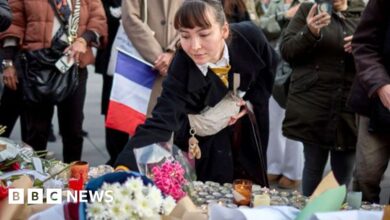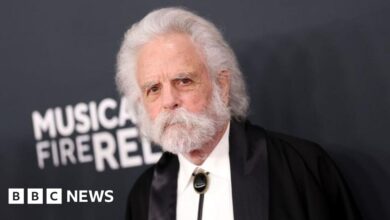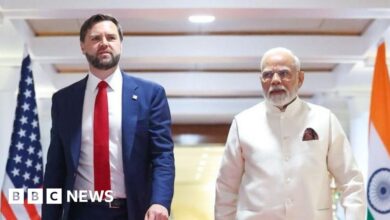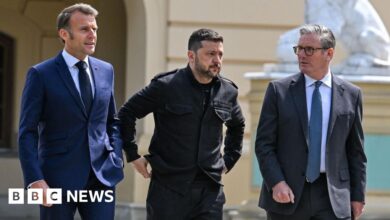Summer camp for children of Ukraine’s missing
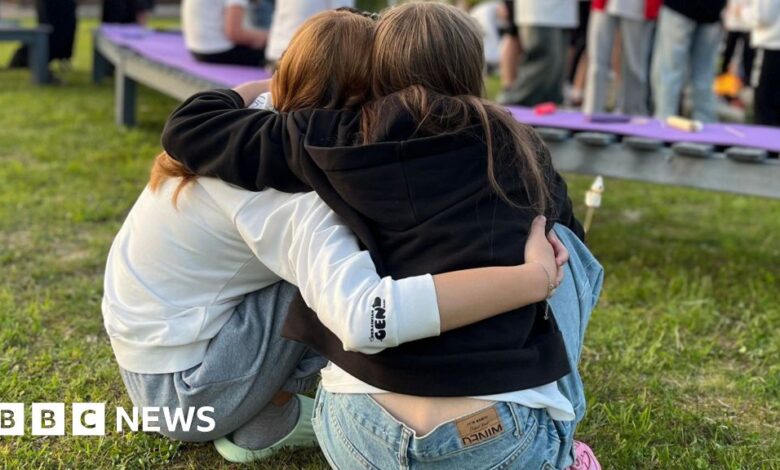
BBC News in Ukraine
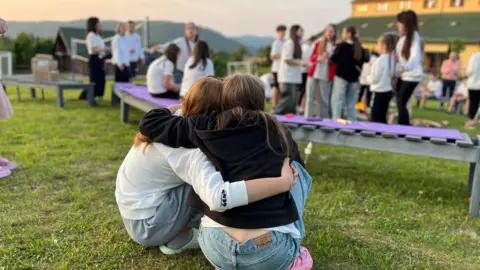 BBC
BBCThe day Russia’s full-scale invasion began, Dima’s dad told him he might never see him again.
“The building in our street got blown up. Dad said, ‘I’m going to do everything I can so that you can live a normal life.'”
Days later, Dima’s father had joined the military and left for the front line.
Fifteen-year-old Dima is sharing memories of his dad with 49 other Ukrainian children. Sitting around a campfire, they hold candles to commemorate their missing loved ones.
The gentle slopes of Ukraine’s Carpathian mountains, smothered in brilliant green spruce and fir trees, stretch into the distance.
It’s a striking backdrop for this heartbreaking scene. We’re in the relative safety of western Ukraine, Russian bombs rarely fall here.
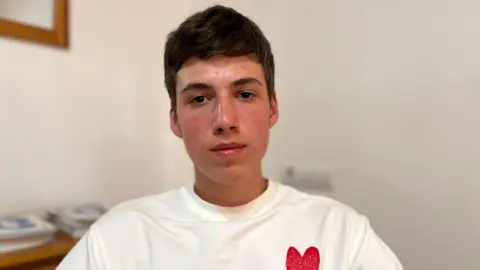
A little girl talks about when the full-scale invasion began.
“The first time we got bombed, my hands were shaking and I was crying,” she says. “It took me a long time to cope with that.”
This campfire activity is a kind of group therapy session. It’s part of a pioneering summer camp for a very special group of Ukrainian children, those with a parent who have disappeared during the war.
Some are soldiers missing in action on the front line, presumed dead. Some are in captivity or trapped in occupied areas.
The Ukrainian government says more than 70,000 people are officially listed as missing.
The charity that runs the camp, Gen.Ukrainian, helps thousands of traumatised children across Ukraine and runs several summer camps.
But this is the first for this category of children, and the BBC was given exclusive access.
“Many of these children have multiple traumas because not only are their fathers missing, but some of them have uncles and grandmothers missing too,” explains Vanui Martirosyan, lead psychologist at the charity.
“They’re living like in a frozen state. They cannot plan something in the future because they do not know what the future will bring. And we cannot work with them like with children with actual loss, because they do not have this point of starting grieving.”
She says many of the children spend hours trawling Russian social media channels, desperately searching for information about their family members. The channels often contain violent content related to the war.
“They feel fear of crying, they think that if they start crying it will continue for forever. This type of trauma is maybe the most difficult to work with.”
The day after the campfire meeting, I speak to Dima, who wants to tell me more about his dad. The last time he heard from him was the day before he disappeared in November 2023.
“He sent a video of them all drinking tea in the forest and wrote me a message saying, ‘Everything’s fine, I’ll call you tomorrow,'” Dima says.
The next day, Dima’s mum got a phone call saying his dad was missing in action.
“I started calling his mobile. Dad didn’t answer. That was it. I was sitting there and I started crying. I realised I wouldn’t see my dad for a while.”
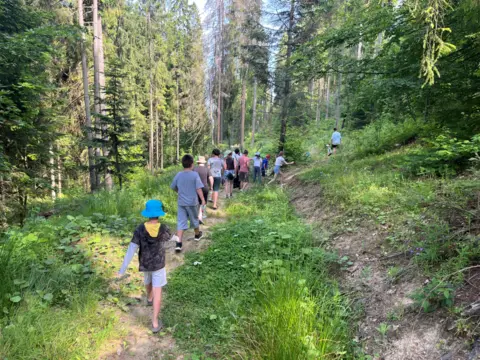
During all our interviews with the children, including with Dima, a Gen.Ukrainian psychologist was present.
“I kept hoping until the end that Dad is a prisoner of war somewhere. Even now I still hope,” Dima says.
Dima’s trauma only intensified after his mum began to look into the circumstances of his dad’s disappearance.
Initially she was told by the military that her husband was missing following an airstrike on his position.
“Then someone else called mum, the chief of something-or-other, and said the Russians shot everyone, and someone saw Dad’s body lying there without any legs. Then another soldier who was at Dad’s position said they saw him dead, with shrapnel wounds to the head.”
Dima says the effect on both him and his mother was profound.
“Mum cried a lot because of that. I supported her,” Dima says. “When Dad left, he said, ‘Dima, no matter what happens you must look after Mum because you’re a man, and you’re her son.”‘
Group therapy at the camp takes place daily, held in small rooms. We are allowed to observe the start of one of the sessions – the rest is confidential.
One psychologists, Olena, shows a colour chart to the children, used to describe emotions. Green is happy, blue is sad, yellow is anxious or overstimulated, and red is anger.
Today, they’ll be discussing sadness. The more unpleasant and sad we feel, says Olena, the more we love the people we are sad about. That shows these people are important to us.
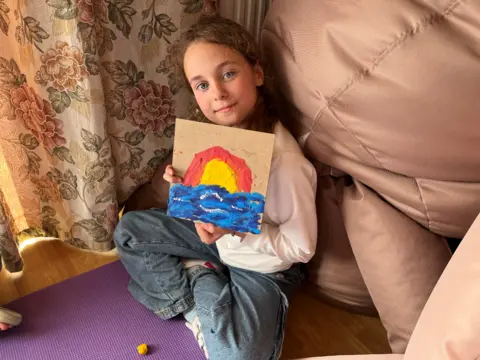
The children are encouraged to express their feelings, including through art. At an art therapy session, many of the paintings show happy families, houses and pets.
One seven-year-old boy, Zahar, tells me his painting is called “Daddy comes home.” It shows yellow stick men in front of a blue sky – the colours of the Ukrainian flag.
Many of the children live in cities that come under near-constant bombardment by Russian drones and missiles. Like 16-year-old Nastia’s hometown of Kharkiv, in the north-east of Ukraine, close to the frontline.
“If there’s bombing nearby, I go and shelter in the corridor. I worry and stress a lot,” Nastia says.
Her father was also a soldier. He disappeared around a year ago on the frontline. She last saw him two weeks before he went missing.
I ask her what memories of your father she has and her eyes glisten.
“He was very kind, he spoilt me a lot. He had a sweet tooth like me, and always knew what treats to buy me,” Nastia says. “I remember only the good things about Dad. The only sad thing I remember is that he disappeared.
“I love him very much and I know he loves me too,” she continues, adding, “I hope we can make new memories with him again.”
This camp also offers the kids a chance to catch up on sleep, uninterrupted by air-raid sirens – and to just have fun and play. There are regular trips to the swimming pool, hikes and games of volleyball.
“It’s important for the body to make movements in order to heal the trauma,” explains head psychologist Vanui.
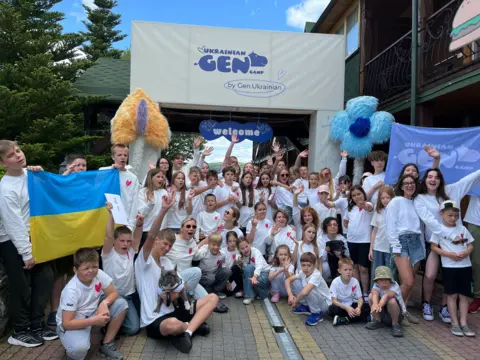
At the camp closing ceremony, it’s time for the children and staff to say goodbye.
One boy, Ilya, is in floods of tears – he doesn’t want to go home.
“We have a child like this in every camp,” smiles Oksana Lebedieva, the founder of Gen.Ukrainian.
She points to the throngs of children playing in the garden.
“Maybe for the first time in their lives, they’ve found people who went through the same experience. And it’s very important. Group therapy is more important than anything – to see you’re not alone with the pain.”
Oksana says the scale of the task facing her charity is overwhelming.
“Millions of Ukrainian children are traumatised by war. This is a humanitarian catastrophe.”
Additional reporting by John Murphy
https://ichef.bbci.co.uk/news/1024/branded_news/3089/live/336e4840-73ac-11f0-a975-cb151ca452f4.jpg
2025-08-11 04:35:55



